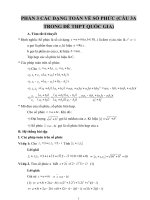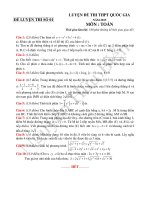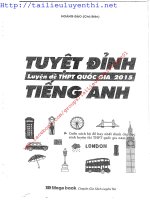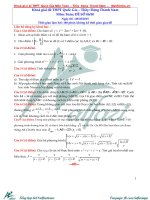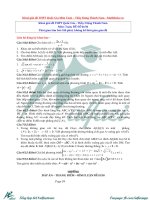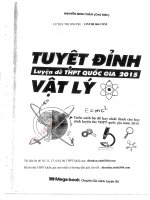DE THPT QUOC GIA 138
Bạn đang xem bản rút gọn của tài liệu. Xem và tải ngay bản đầy đủ của tài liệu tại đây (128.86 KB, 4 trang )
<span class='text_page_counter'>(1)</span>SỞ GD&ĐT VĨNH PHÚC TRƯỜNG THPT LIỄN SƠN (ĐỀ LUYỆN 138). ĐỀ THI THỬ THPT QUỐC GIA NĂM 2015 MÔN THI: TIẾNG ANH Thời gian: 90 phút. PHẦN TRẮC NGHIỆM: (8 điểm) Read the following passage and mark the letter A, B, C, or D on your answer sheet to indicate the correct word for each of the blanks from 1 to 10. Experiments have proved that children can be instructed in swimming at a very early age. At a special (1) ___ in Los Angeles, children become expert at holding their (2)____ under water even before they can walk. Babies of two months old do not appear to be reluctant to enter the (3)____.It is not long before they are so accustomed to (4)____ that they can pick up weights from the (5)___ of the pool. A game that is very popular with these young (6)____ is the underwater tricycle race. Tricycles are lined up on the floor of the pool seven feet under (7)____. The children compete against each other to reach the other end of the (8)____.Many pedal their tricycles, but most of them prefer to push or drag them. Some children can cover the whole length of the pool (9) ___ coming up for breath even once. Whether they will ever become future Olympic champions, only time will tell. Meanwhile, they should encourage those among us who cannot swim five yards (10) ___ they are gasping for air. Question 1: A. swimming pool B. church C. stadium D. park Question 2: A. clothes B. breath C. hands D. heads Question 3: A. swimming pool B. water C. house D. club Question 4: A. jogging B. talking C. swimming D. walking Question 5: A. top B. side C. base D. floor Question 6: A. swimmers B. football- layers C. singers D. coaches Question 7: A. age B. ground C. water D. sun Question 8: A. sea B. pool C. lake D. river Question 9: A. owing to B. by C. with D. without Question 10: A. before B. after C. when D. as soon as Read the following passage and mark the letter A, B, C, or D on your answer sheet to indicate the correct answer to each of the questions from 11 to 20. History books record that the first film with sound was The Jazz Singer in 1927. But sound films, or "talkies", did not suddenly appear after years of silent screenings. From the earliest public performances in 1896, films were accompanied by music and sound effects. These were produced by a single pianist, a small band, or a full-scale orchestra; large movie theatres could buy- sound-effects machines. Research into sound that was reproduced at exactly the same time as the pictures – called "synchronized sound" – began soon after the very first films were shown. With synchronized sound, characters on the movie screen could sing and speak. As early as 1896, the newly invented gramophone, which played a large disc carrying music and dialogue, was used as a sound system. The biggest disadvantage was that the sound and pictures could become unsynchronized if, for example, the gramophone needle jumped or if the speed of the projector changed. This system was only effective for a single song or dialogue sequence. In the "sound-on-film" system, sounds were recorded as a series of marks on celluloid which could be read by an optical sensor. These signals would be placed on the film alongside the image, guaranteeing synchronization. Short feature films were produced in this way as early as 1922. This system eventually brought us "talking pictures". Question 11: The passage is mainly about the______. A. history of silent movies B. disadvantages of synchronized sound C. development of sound with movies D. research into sound reproduction Question 12: According to the passage, films using sound effects were screened______ A. before 1896 B. as early as 1896 C. as early as 1922 D. in 1927 Question 13: The word "screenings" is closest in meaning to ______ . A. projections B. revelations C. demonstrations D. diversions Question 14: Which of the following is NOT mentioned as a producer of sound to accompany movies? A. a jazz singer B. a single pianist C. a small band D. a gramophone Question 15: It can be inferred that______ . A. most movie theatres had a pianist B. sound-effects machines were not common because they were expensive C. orchestras couldn't synchronize sound with pictures.
<span class='text_page_counter'>(2)</span> D. gramophones were developed about the same time as moving pictures Question 16: According to the passage, gramophones were ineffective because they ______. A. got out of synchronization with the picture B. were too large for most movie theatres C. were newly invented and still had imperfections D. changed speeds when the needle jumped Question 17: The word "sequence" is closest in meaning to ______. A. interpretation B. progression C. distribution D. organization Question 18: The phrase "these signals" refers to______. A. sounds B. series C. marks D. sensors Question 19: According to the passage, sound-on-film guaranteed synchronization because the recording was____. A. made during the filming of the picture B. read by an optical sensor C. inserted beside the image on the film D. marked on the gramophone Question 20: Short feature films produced as early as 1922 ______ . A. were recorded by optical sensors B. put musicians out of work C. were only effective for dialogue sequences D. preceded talking pictures Read the following passage and mark the letter A, B, C, or D on your answer sheet to indicate the correct answer to each of the questions from 21 to 30. Today's cars are smaller, safer, cleaner, and more economical than their predecessors, but the car of the future will be far more pollution-free than those on the road today. Several new types of automobile engines have already been developed that run on alternative sources of power, such as electricity, compressed natural gas, methanol, steam, hydrogen, and propane. Electricity, however, is the only zero-emission option presently available. Although electric vehicles will not be truly practical until a powerful, compact battery or other dependable source of current is available, transportation experts foresee a new assortment of electric vehicles entering everyday life: shorter-range commuter electric cars, three-wheeled neighborhood cars, electric delivery vans, bikes, and trolleys. As automakers work to develop practical electrical vehicles, urban planners and utility engineers are focusing on infrastructure systems to support and make the best use of the new cars. Public charging facilities will need to be as common as today's gas stations. Public parking spots on the street or in commercial lots will need to be equipped with devices that allow drivers to charge their batteries while they stop, dine, or attend a concert. To encourage the use of electric vehicles, the most convenient parking in transportation centers might be reserved for electric cars. Planners foresee electric shuttle buses, trains, buses, and neighborhood vehicles all meeting at transit centers that would have facilities for charging and renting. Commuters will be able to rent a variety of electric cars to suit their needs: light trucks, one-person three-wheelers, small cars, or electric/gasoline hybrid cars for longer trips, which will no doubt take place on automated freeways capable of handling five times the number of vehicles that can be carried by a freeway today. Question 21:. The following electrical vehicles are all mentioned in the passage except ______ A. vans. B. trains. C. planes. D. trolleys. Question 22: The author's purpose in the passage is to ______ A. criticize conventional vehicles. B. support the invention of electric cars. C. narrate a story about alternative energy vehicles. D. describe the possibilities for transportation in the future. Question 23: The passage would most likely be followed by details about ______ A. automated freeways. B. pollution restrictions in the future. C. the neighborhood of the future. D. electric shuttle buses. Question 24:. The word "compact" in the second paragraph is closest in meaning to ______ A. long-range. B. inexpensive. C. concentrated. D. squared. Question 25: In the second paragraph the author implies that ______ A. a dependable source of electric energy will eventually be developed. B. everyday life will stay much the same in the future. C. a single electric vehicle will eventually replace several modes of transportation D. electric vehicles are not practical for the future. Question 26: According to the passage, public parking lots of the future will be ______ A. more convenient than they are today. B. equipped with charging devices. C. much larger than they are today D. as common as today's gas stations. Question 27: The word "charging" in this passage refers to ______.
<span class='text_page_counter'>(3)</span> A. electricity. B. credit cards. C. aggression. D. lightning. Question 28: The word "foresee" in this passage could best be replaced with ______ A. count on. B. invent. C. imagine. D. rely on. Question 29: The word "commuters" in paragraph 4 refers to ______ A. daily travelers B. visitors C cab drivers. D. shoppers. Question 30:. The word "hybrid" in paragraph 4 is closest in meaning to ______ A. combination. B. hazardous. C. futuristic. D. automated. Mark the letter A, B, C, or D on your answer sheet to show the underlined part that needs correction. Question 31: I couldn't give the teacher the summary of the lesson until Julia whispered some words into his ears. A B C D Question 32: Those who have never been abroad is eager to see how different the other cultures are. A B C D Question 33: I will have you to know how bad your behaviour is. A B C D Question 34: Peter has gone on a sailing course in spite being unable to swim A B C D Question 35: You have unnecessary sent me the copies of the files which have been sorted out. A B C D Mark the letter A, B, C, or D on your answer sheet to indicate the correct answer to each of the following questions. Question 36: The students were slow to catch ______ but gradually they began to understand. A. in B. on C. away D. out Question 37: The soldier was punished for_____ to obey his commanding officer’s orders. A. refusing B. regretting D. objecting D. resisting Question 38: She’ll be a millionaire by the time she ______ forty. A. is B. was C. will be D. is going to Question 39: ______the rise in unemployment, people still seem to be spending more. A. Nevertheless B. Meanwhile C. despite D. Although Question 40: Their flat is decorated in a ______ combination of color. A. tasteful B. sweet C. delicious D. tasty Question 41: I wish you ______ stop interrupting me whenever I speak. A. will B. would C. did D. might Question 42: This ring is made of plastic so it is quite ______. A. valuable B. invaluable C. worthless D. priceless Question 43: You can’t enter this camp without ______ from the General. A. control B. a demand C. a permit D. an allowance Question 44: Tony’s boss doesn’t want him to ______ a habit of using the office phone for personal calls. A. make B. do C. have D. increase Question 45: She ______ her husband’s job for his ill health. A. accused B. blamed C. caused D. claimed Question 46: He ______ the bowl of soap all over the table- cloth. A. stained B. spilt C. scatted D. set Question 47: It’s time we ______ this old car and bought new one. A. will sell B. had sold C. have sold D. sold Question 48: As ______ as I know, we have not received a bill for the new computer. A. much B. long C. soon D. far Question 49: The project was rejected because of ______ funds. A. unavailable B. inconsiderable C. incomplete D. insufficient Question 50: She is ______ to leave as soon as possible. A. cautious B. anxious C. worried D. nervous Question 51: Ann agreed to stay behind; she was used to ______ late. A. working B. have worked C. work D. being worked Question 52: We look everywhere but the intruder was nowhere ______ A. to see B. seen C. to be seen D. having seen Question 53: I haven’ time to speak to him now, you’ll have to put him ______.
<span class='text_page_counter'>(4)</span> A. off B. back C. aside D. away Question 54:. Nobody seems to be ______ control of these children. A. under B. over C. with D. in Question 55: The coins are ______ to be over a thousand years old. A. described B. said C. told D. mentioned Question 56: I bought this grammar book______ I could not go over all the things we have studied this year. A. that B. so that C. seeing that D. so far as Question 57: You know I’ll always stand ______ you if you are in trouble. A. by B. with C. for D. up Question 58: Hair colour is one of ____ characteristics to be used in identifying people. A. the most obviously B. most obvious C. obviously the most D. the most obvious Question 59: I would appreciate it _______ what I have told you a secret. A. you can keep B. that you kept C. you will keep D. if you kept Mark the letter A, B, C, or D on your answer sheet to indicate the word that differs from the rest in the position of the main stress in each of the following questions. Question 60: A. obtain B. neglect C. necessary D. mature Question 61: A. material B. magnificent C. considerable D. literature Question 62: A. investigate B. introduce C. guarantee D. generation Question 63: A. gather B. fortune C. abandon D. temperate Question 64: A. separate B. satellite C. satisfy D. routine PHẦN TỰ LUẬN: (2 điểm) I. Rewrite the following sentences using the words given so that it means exactly the same as the first sentence. 1. People all over the country have helped the poor people in the flood region. The poor people_________________________________________________ 2. It’s cold in the morning, so the children go to school in heavy clothes. Because of_________________________________________________ 3. David has read a lot of books, however, he cannot find a good solution. Although_________________________________________________ 4. It isn't necessary to finish the work today. You don't _____________________________________________________ 5. Hai finally managed to get a job Hai finally succeeded____________________________________________ II. Topic: What are the factors to enable a longer life? With the development of human society, people are living longer now. Many factors interacting together enable the longer life. There are three most important causes: the quality of food has been greatly improved; people could have medical services; more and more people realize that regular sports benefit their health. The improving quality of our food is the most important factor of the longer life. We could have not only enough food as we want, but also the healthier food. When we preparing food, we no longer consider the cost, but pay more attention to the nutritions of the food. With the development of transportation systems, inland people now could also enjoy seafood and tropical fruit. Furthermore, governments are paying more and more money on medical establishments. Citizens could have medical services more easily. Because of the convenient medical service more illnesses could be detected at an earlier stage. Also, many illnesses that had been considered fatal could be cured today. The better detection and cures enable people's longer life. Last but not least important is that people care more for their own health. Every morning you could see people doing sports outside. More and more people have realized the saying "life is locomotion". Regular sports build up a strong body. Naturally, people with stronger body could resist more diseases. To sum up, the development of our society causes the longer life of people. People have better food and better medical services. And people spend more time on sports to build up stronger bodies. As we could predict, people are going to live even longer. ------------- THE END ----------.
<span class='text_page_counter'>(5)</span>


